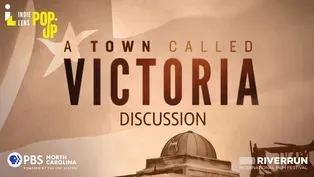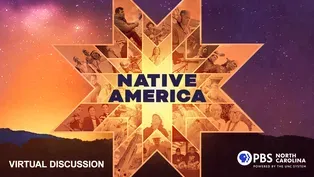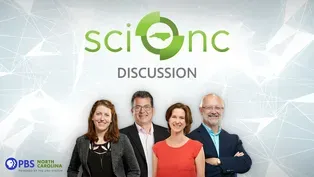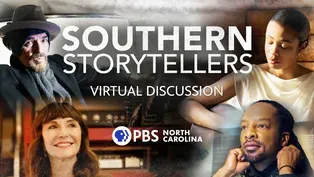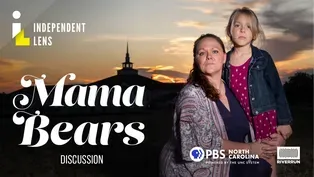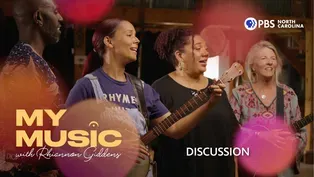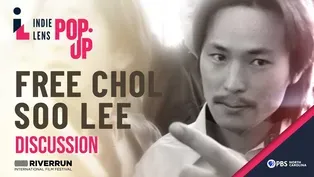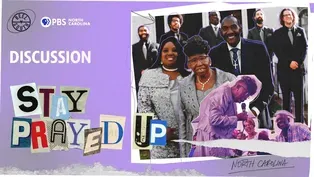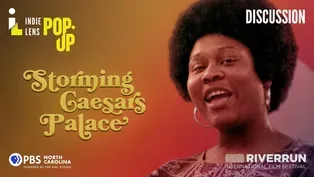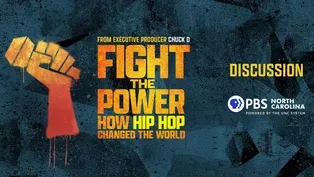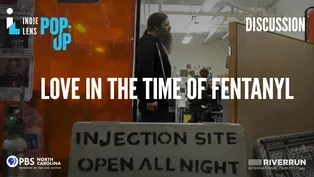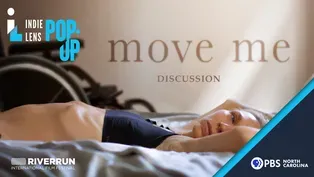PBS North Carolina Specials
Discussion | A People’s History of Asian America
5/27/2021 | 43m 40sVideo has Closed Captions
The filmmakers and others discuss current events affecting the AAPI community.
Dolly Li, Adrian De Leon, Chavi Khanna Koneru and Sapana Sakya discuss the PBS Digital Studios series, A People’s History of Asian America, that unpacks micro-aggressions towards Asian Americans and their roots in American history. They talk about combating racism, promising legal measures and more.
PBS North Carolina Specials
Discussion | A People’s History of Asian America
5/27/2021 | 43m 40sVideo has Closed Captions
Dolly Li, Adrian De Leon, Chavi Khanna Koneru and Sapana Sakya discuss the PBS Digital Studios series, A People’s History of Asian America, that unpacks micro-aggressions towards Asian Americans and their roots in American history. They talk about combating racism, promising legal measures and more.
How to Watch PBS North Carolina Specials
PBS North Carolina Specials is available to stream on pbs.org and the free PBS App, available on iPhone, Apple TV, Android TV, Android smartphones, Amazon Fire TV, Amazon Fire Tablet, Roku, Samsung Smart TV, and Vizio.
Providing Support for PBS.org
Learn Moreabout PBS online sponsorshipMore from This Collection
Discussion - A Town Called Victoria - Independent Lens
Video has Closed Captions
The filmmaker and former Victoria residents share their story. (46m 51s)
Discussion - Native America Season 2
Video has Closed Captions
Panelists discuss preserving the languages of Native American tribes. (39m 1s)
Video has Closed Captions
Sci NC executive producer and host, Frank Graff, chats about upcoming Season 6 of Sci NC. (26m 6s)
Discussion - Southern Storytellers
Video has Closed Captions
Author David Joy and others discuss storytelling and their new PBS series. (42m 13s)
Discussion - Mama Bears | Independent Lens
Video has Closed Captions
Producer and director Daresha Kyi discusses the film and LGBTQIA+ advocacy. (34m 41s)
Discussion - My Music with Rhiannon Giddens
Video has Closed Captions
Discussing the series with producers Will & Deni McIntyre and country artist Rissi Palmer. (39m 56s)
Discussion - Free Chol Soo Lee | Independent Lens
Video has Closed Captions
Local lawyers, professors and nonprofit leaders discuss wrongful convictions and reentry. (40m 44s)
Discussion - Stay Prayed Up, Reel South
Video has Closed Captions
The filmmakers discuss their journey with Mother Perry and The Branchettes. (45m 4s)
Discussion - Storming Caesars Palace | Independent Lens
Video has Closed Captions
Local professors and nonprofit leaders discuss welfare and the social safety net. (33m 2s)
Discussion - Fight the Power: How Hip Hop Changed the World
Video has Closed Captions
Local experts discuss the history of hip hop with PBS North Carolina. (59m 43s)
Discussion - Love in the Time of Fentanyl | Independent Lens
Video has Closed Captions
Local harm reductionists, therapists and others discuss the opioid crisis and more. (55m 44s)
Discussion | Independent Lens: Move Me
Video has Closed Captions
A dancer with blindness and disability advocates discuss adaptable arts programs. (38m 46s)
Providing Support for PBS.org
Learn Moreabout PBS online sponsorship- Hi, everyone.
Welcome to PBS North Carolina's virtual screening and panel discussion on the new digital series "A People's History of Asian America".
The series unpacks microaggressions towards Asian Americans and uncovers their roots in American history.
I hope you enjoyed the first two episodes.
Why the China virus has always been a part of U.S. history and where the Asian fetish comes from.
Thank you again for joining us.
We have a wonderful group of special guests here today.
I'm Sapna Sakya, the talent development and special projects manager at the Center for Asian American Media or CAM, based in San Francisco.
And our mission is dedicated to presenting stories that convey the richness and diversity of the Asian-American experience to the broadest audience as possible.
Our work in the south really started with PBS North Carolina.
So we're really excited to host this conversation with you all.
It's my pleasure to welcome our panelists.
Please help me welcome the co-hosts for the "People's History of Asian America".
We have Dolly Li and Adrian De Leon here with us.
- Hi everyone.
- Welcome.
Hi, hi.
Dolly is the writer, host, director and producer of "A People's History of Asian America".
She's an award-winning video journalist and documentarian.
Adrian is also the writer host and he's a historian, poet and essayist at the University of Southern California.
Finally, we also have Chavi, Khanna Koneru who's the co-founder and executive director of North Carolina Asian-Americans Together or NCAT.
Welcome Chavi.
Chavi.
All right.
So without further ado, I was wondering Dolly and Adrian if I could start with you two.
Tell us a little bit about how this series came about.
i know that we're sort of in the middle of this pandemic, going into the second year and it's, there's definitely been this heightened sense of, I guess the racial reality of America, right?
So maybe you can give us a little bit of background on how this series came about.
- Hi everyone.
And thank you Sapna for the wonderful introduction.
Really excited to be on this panel with Chavi, with Adrian and excited to be talking to everyone here.
So, I think a lot of America has been dealing with this racial reckoning, at least for the past year but for so many people who are people of color in America, it's your life, right?
It's your identity.
And so it's interesting to see in this past year there's been so much more interest in Asian-American stories.
Stories that of course we've been talking about for so long.
Adrian and I also met before the pandemic and have always had ideas of collaborating together, bringing together academia and media to find a way to bring more of ethnic studies to an accessible audience.
And so much of "A People's History of Asian America" is inspired by the class that Adrian teaches as his Asian American 101 course at USC, which was originally conceived to be where each episode was focused on a microaggression.
And I thought that was such a wonderful way to structure this conversation around Asian Americans.
Of course, I'll have Adrian discuss where the ideas from that class came from as well, but to really evolve that class to match the conversations of 2021, we felt that we have to talk more than just microaggressions, right?
We are talking about real violence here that's happening in 2020 and 2021.
And that's why the show kind of evolved to become "A People's History".
- Just to kind of follow up on that also in the academy, as Asian-American studies scholars, we've had maybe 50 years of this discipline and of this field of departments which are still being fought for all over the United States and elsewhere, right?
So much of the work that happens in the classroom and in our research takes place at a few radical, also an empirical level but also in general, on a scholarly level.
That's sort of step one of the knowledge production.
But number two, both as an educator, but also in this spirit of the first activist who really advocated for fields and classrooms and types of political education like ethnic studies is the dissemination and the circulation of the translation of this knowledge, right?
That as complex as these concepts might be, it as also simultaneously our job as educators and this is a commitment I really share with the Center for Asian American Media as well as my good friend, Dolly, the dissemination of publicly accessible political education which we really was at the front and center of so many of the first activist concerns and what they advocated for.
So I think right now in the year of, people have called it a racial reckoning.
I'm not quite sure if we're having a systemic reckoning of it much more so than an awareness, right?
We also need this type of education, this type of, to sort of supplement the ongoing movements to treat this year as a sort of call to action to address not just recent anti-Asian violence, anti-black violence, but think about it in the context of the original establishment of this nation.
And from there, what can we do with this history to mobilize it?
And so I'm just, this has been something that Dolly and I have been cooking for a while now and we're excited to cook up some more for you.
- Thank you so much.
Yeah, I'm thinking I had, I had taken your class when I was in college.
I don't know that it existed back then, but I'm jealous of your students.
I wanted to move to Chavi, and bring it back to North Carolina a little bit.
Can you tell us a little bit about the work of NCAT but also maybe give viewers a background on the Asian-American community and the demographics in the state perhaps, and the region?
- Yeah, I definitely can.
I'm also jealous by the way that none of these courses existed when I was in school.
And I'll tell you that that's kind of where a lot of the inspiration for forming the organization came from.
My co-founder Ricky and I both grew up in North Carolina for the most part.
I moved from Northern California and spent the majority of my time living here, trying to understand where I, as an Indian person, as an Asian fit into the south and the stories of the south that are so black and white.
And, in, I moved back to the area in 2014 and I saw, like visually saw that the population had surged.
And of course the data also reflected that.
And all of a sudden Asian Americans mattered in the upcoming 2014 midterm elections.
And the reason that felt important was not just because like my background was in voting rights and what I was passionate about, but also because I thought, well, we finally get a seat at the table.
We finally get a voice.
And that's really how we started working on this.
In 2016, as we got closer to the election, we kind of turned into an actual organization.
And in terms of, so at the moment, we're the only pan Asian kind of civic engagement, social justice focused organization in the state.
Which is crazy because it's 2021.
And in terms of like the demographics of the state, there's over 40 different ethnicities.
It's home to a lot of Southeast Asian refugee communities.
Probably the biggest, not probably, the biggest of the Asian-American communities in North Carolina are Indian Americans.
And they've been here the longest, but even their numbers have just like multiplied by 10.
It's insane to look at what it was like when I moved here.
And people just assume that the only other Indian kid in my entire school was related to me because of course, right?
So yeah, I mean, I'm excited to share more about kind of what's going on in North Carolina.
And I know that this is a moment but I want to take advantage of this moment and talk about what's going on here, what our community looks like as much as possible because there's still the perception across the country and in the state that there's no Asians in the south or in North Carolina.
We're here.
So I'm looking forward to this conversation.
- Thank you for that.
Yeah.
I was wondering, there's been such an increase or rather there's been, like Adrian pointed out maybe a more of an awareness of this trend towards the violence against Asian Americans.
And I was wondering what that looks like in the state of North Carolina or I also know that you created a bias reporting portal.
I was wondering if that was in reaction to something that was happening in the state as well.
Can you talk about that a little bit?
- Yeah.
Absolutely.
I mean, the first thing I'll say is that nobody really knows if there's an increase because there just isn't good data around this, right?
At the moment, all the data that the FBI collects is based on voluntary reporting from law enforcement agencies.
And I'll let you guess how many voluntarily report that.
So I would agree with Adrian in that I don't know that there's so much of a rise as there is more attention placed on it.
And we used that as an opportunity to support our community in telling their stories and feeling like they can share the incidents that they've been dealing with probably for decades.
There's also this, often the sense in the community that, if you are harassed, if you are, if you're the target of violence based on race or ethnicity, it's something to be embarrassed about.
And that was another reason that we formed the portal was just to also say, "Hey, we're here to support you and listen to your story.
"And there's nothing wrong with, "the fact that you were..." Well, there's a lot wrong with the fact that you were targeted but in terms of like, there's something wrong with you, right?
So we did create the portal for that reason because in March of last year, immediately after the pandemic started, and I know this was talked about in the video as well, in terms of terms like China virus and such putting a spotlight on folks who are either of East Asian descent or perceived to be of East Asian descent.
And we've gotten, we've gotten folks to respond to that.
We also were able to have the first Asian American Advocacy Day at the General Assembly to support hate crimes legislation.
I do want to add that like Dolly, I am skeptical.
However, again, I think if it motivates our community to come out and feel like they can have their voices heard, I'm all for that.
So, I think I answered your question.
- Yeah.
I mean, this is like such a vast topic.
I feel like we could definitely talk about this for a long time and have a lot to unearth.
Someone from the audience also, I think this was for Chavi, asked whether there are any laws locally that have been enacted or efforts to combat racism.
I'm not really sure.
And the other part of their question is whether there have been any sort of, let's see, efforts to collaborate with other groups perhaps to fight racism or acts of racism.
- Yes, in terms of, like laws on the book or laws that have been passed in North Carolina, the answer is definitely no.
We are very far away from something like that being passed in the state, honestly, in my opinion.
But in terms of collaborating with other groups, yes.
All the work we do is in cross racial, cross ethnic coalitions and part of what our organization's mission and vision is, is to support all communities of color.
It's not about, the focus on Asian Americans, again, is in this moment but it's important that we recognize the stories and the histories of all the communities in the state and across the nation.
- Yeah.
Thank you.
That reminds me of the term that Dolly and Adrian like to use.
I think it emerged in the second episode, right?
Intersectionality.
I love the little rainbow effect.
- Yes.
- Maybe talk about that a little bit Dolly and maybe Adrian as well, about how that is such an important part of this story, right?
Asian Americans don't live in or don't exist in isolation.
It is about working together like Chavi said with other groups as well.
And when uncovering the history, right, of Asian-Americans, it's so embedded in white supremacy, in imperialism.
Talk a little bit about that.
And, when approaching your series in particular, how much, yeah, talk a little bit about that and how we sort of exist.
This history is not in silos, right?
It's alongside other communities in the U.S. as well.
- Right, and I think Adrian can definitely point to a lot more examples of ways in which Asian Americans intersect in their struggle for equality and for social justice.
But as a philosophy for us, intersectionality, it goes beyond talking about it, right?
It needs to be baked into how we interact with everyday people.
For me, as a journalist, it's baked into who I source as voices on camera, right?
Like we make an active decision in our video about feminism, about fetish, about the hyper-sexualization of women to also include black women's voices, right?
Because that struggle is shared with the struggle that women of color also feel and experience, right?
And that is the only way we can really learn from one another, right.
And I really do believe in that, right.
Intersectionality doesn't just apply to us discussing it in conversation.
It also applies to the moments where you're at work and you hear a female colleague, getting reprimanded or getting a much harsher criticism than a male colleague would and stepping up and saying something, right?
Intersectionality also has to be practiced.
And I'm sure, Adrian has a lot to say about that as well.
It's so baked into so much of his academic work.
- Well, I love the fact that I think, one of our first events to talk about this series is in North Carolina and it's not somewhere sort of obvious, right?
Like California.
Dolly and I are not from California.
I'm Canadian, Dolly's from Brooklyn, New York.
And we both have very, very dear aspect of ties to the South.
Well, Dolly is from Texas.
Myself is through family in Virginia and North Carolina, specifically Wilson and Raleigh.
And one of the reasons why I mentioned that is that ethnic studies, ethnic studies education, one of the reasons why intersectionality is important and also across racial representation and advocacy is that institutions often silo one to specific topics.
You study the history and the sociology of race, of gender or you study Asian Americans and mostly you study people on the West Coast, right?
Like the West Coast is seen as the sort of Asian and LatinX space.
The south is seen as a black and white space, right?
Whereas actually the stories of our individual communities combined together actually make the fuller picture of a very violent history of the United States, right?
And so we think about the Asian fetish with respect to a lot of the work that black feminists do.
But also we think about the role of settler colonialism and indigenous dispossession and indigenous advocacy right now in this broader picture of anti-Asian violence.
That Asian people built the railroads on stolen native land, for example.
And so some of the future stories we'd want to tell the future and the stories that are being told both on intersectional but also in the cross-community lens are how our histories constitute each other.
And therefore our mutual futures also need to be told together and need to be taught together.
- Thank you for that.
I was wondering, so I know that the third episode wasn't screened but there's a question that came in that kind of speaks to the third episode.
Someone was curious about, given the diversity of the Asian-American umbrella, right?
I mean, it traverses not just a large continent and so many different countries with so many different islands in the Pacific as well.
And the audience member's question is about, they say, "I'm curious about the depth of solidarity "among the various groups, "East Asian, South Asian, Southeast Asian, "under the Asian American umbrella.
"Are there tensions between and among the different groups?"
I was going to say you should watch the third episode.
- Watch the third episode.
- But maybe Dolly and Adrian, you could talk to that a little bit.
And then I would love to hear from Chavi as well.
- Can I speak to that a little bit?
Obviously, because there's an overlap with the third episode.
But in short, the original articulation of Asian American was as a political identity, as a way to articulate a solidarity that may or may not exist, but that is meant to sort of bring various communities together to fight for a common cause, which is social and racial justice.
One of the things that has happened over the past 50 years is that you had to sort of flipping in terms of Asian American men, which is we charted from a political identity and a political articulation to a census identity, to an institutionalized identity.
That happened with ethics studies and education as well, right?
And so now the conversation becomes about who was included under the umbrella versus what the umbrella and the community was meant to do.
And one of our interviewees for the third episode, Arianne, was really fascinating how he articulated it.
He's south Asian from South Africa and he realized first and foremost, does this Asian American identity include me and he talked about the fact that yes, it was, it should as a political identity because it was meant for us to sort of band together and find ways to combat racism, institutional racism.
And so, that also means that there are all these tensions in between our groups and also across groups as well that not only need to be addressed, but need the fullness of Asian American stories in order to be talked about, right?
That not everyone is a crazy rich Asian.
Not everyone's from China, Japan, Korea.
And most certainly not in the United States, which is both diverse but that diversity is built on all these larger violent histories of imperialism, of refugee histories, of migration histories and stuff like that.
- Dolly, did you want to add to that or... - No, I think you can see in our third episode how often this conversation comes up, right?
Like who gets to be Asian-American?
What does representation look like?
Right.
When we also talk about, like of course South Asians are part of Asian American but sometimes when you look at the issues that happen in South Asian communities, why aren't East Asians also talking about that, right?
Like when we talk about what happened at that FedEx facility recently with the shooting there, when we talk about the war on terror, very often you saw a lot of Asian-Americans didn't see that as something that impacted them.
But it's clearly something that impacts a lot of South Asians and Muslim Americans, right?
So I think that in the growingly more diverse Asian America beyond looking at our past, a lot of it is looking towards the future, right?
Like what is the future of Asian-America going to look like and how do we build for an inclusive community where all of our stories really do matter, right?
And we see, going back to intersectionality, it goes beyond like race and gender, just looking at our own very diverse, complex community.
How do we make sure that we all elevate each other's voices?
- Yeah, maybe Chavi you could talk, I mean, talked about it a little bit, right?
That the largest community of Asian Americans is actually Indian American in North Carolina.
Yeah.
What is that perspective?
And also, sorry, that you created NCAT because there was this diversity in community and everyone was creating their own little groups, right?
You could talk to that a little bit.
- Yeah.
Yeah, and I feel like, particularly in the last few months I've had to make the very clear distinction that the reason that we formed NCAT to be a pan Asian organization was to promote the idea of that political identity.
Because in a state like North Carolina, sure, if I was just thinking about supporting the Indian-Americans in the state, then yeah, I would have maybe formed an organization that was like Indian American focused, right?
But if we're thinking about really wanting to elevate all Asian Americans of all ethnicities, particularly those who are on the lower end of the socioeconomic scale and don't have the same access to resources or to legislators or to being part of politics, then we really have to find solidarity around this Asian-American political identity.
That said, I didn't grow up thinking of myself as Asian American.
I mean, it took me awhile to even think of myself as south Asian quite honestly.
I remember having to come home and ask my parents, "What am I?"
Because I came from a very diverse place in California where nobody really talked about it.
We were, there's just a whole bunch of different races and ethnicities.
And we were just fine with not discussing it.
In North Carolina, it was very, very important to identify what race you were, what ethnicity you were.
And I went to UNC Chapel Hill for college.
And even within the South Asian community, you needed to identify what kind of Indian were you and not to bring caste in this conversation, but all of that, you see it reflected here.
I hear the thing about division.
And I noticed that particularly with my community, during the rise of Islamophobia, where people who were not Muslim but South Asian were targeted and they would say, "Well, I'm targeted, "but I'm not even Muslim."
And that's just like not the right way to approach this, right?
Because it doesn't really matter what you are, it's that we don't want that hate directed towards any communities of color.
Period.
The other thing I'll say is that it's really important to distinguish between that being a political identity and lumping Asian Americans together in pretty much every other sense.
Because not dis-aggregating that data by ethnicity is so detrimental to the community.
And I'll just, a relevant example right now is if you look at, in North Carolina, how race has impact, I mean how COVID has impacted communities by race.
Asian Americans are at the bottom of that list.
We are the least impacted by COVID deaths.
We are the least impacted by the economic impacts of COVID and such.
But if you break that number down by ethnicity, you see that the Filipino community has been greatly impacted by COVID deaths more than the black and Latin X community in some places, right?
And same with other refugee communities.
And so I want to make sure that this is clear because I think it's so, so, so important that we start talking about the different communities outside of this political identity as the communities they are, rather than as Asian Americans.
- Yeah.
That's so important.
Again, I think episode three talks about that a little bit.
The need for dis-aggregation because, I mean, personally as well, I love how that episode starts.
Like, do you consider yourself Asian American or what does AAPI mean?
And now there's a new acronym, right?
AANHPI.
And I mentioned that actually to one of our colleagues who's a part of the Pacific Islanders in Communication.
And they said, "So why is it only Asian American "but not, there's no American behind anyone else?"
And I hadn't even thought about that.
So it's going to be really difficult like you've all said to lump everyone together 'cause it's not going to fulfill everyone's need or, afford the visibility for each and every specific community.
To maybe...
Sorry, go ahead.
- I just wanted to add in one thing is just that we made a conscious decision about a year ago to stop using the term AAPI.
And that is because the Pacific Islander community is its own community.
And there, sure there are some similarities but I feel like it takes away from the, it takes away and the majority of us who are talking about AAPI are not talking about Pacific Islander communities.
We're talking about Asian Americans.
So just throwing out there that I'm hoping we can start to shift away from that because I just don't feel like it's fair to those communities.
- Yeah.
No, thank you for mentioning that.
I should also say that CAM used to, and also use AAPI or, and I think, I forgot what it was, but it was pretty early on that the Pacific Islander community wanted to create their own media arts network and then created Pacific Islanders in Communication.
So I totally hear you on that.
Thank you for bringing that up.
So we have another question from the audience.
And it's for Dolly and Adrian and they ask if you could discuss a little bit who the target audience is for the series and, I guess who you had in mind, right?
And what have the results been so far?
Have you, well, this is difficult to know.
Or I guess what was your goal with the series, it says, to stop hate crimes or maybe you could talk in general about what the response has been to the series so far.
- Oh, I'm sorry for that fire alarm.
So I think this goal of stopping hate crimes, personally, I just, I think hate is very temporary.
When we talk about stop Asian hate and no real movement nor change has ever really been born out of hate.
And when I think about what actually is sustainable as a movement, it's not just addressing violence, right?
So the work that I think that we've all been doing has been, it's been in existence and it's been happening since before the hashtags, before it was trendy, before it was relevant on Twitter and something that could be monetized.
And so I think that our series goes way beyond stopping AAPI hate because the reality is, the hate crimes are going to continue for all black and people of color, communities of color, right?
It's about educating people to address these crimes, address the violence.
What our show actually really shows you is that these, the violence is cyclical.
It continues to happen, right?
And so whenever we're writing for our stories, I'm always, Adrian and I are always working through the language, right?
We are working through our own, the information that we have as Asian-Americans, the information Adrian has as an academic.
And we're always thinking about like, well, how do we explain this to our teenage cousin, right, who really does want to understand what does a model minority mean?
Why can't I use, what's wrong with saying Asian-American, or what's wrong with "Crazy Rich Asians" representing all Asians, right?
Like young people who are very curious about the world, about understanding their identity, way more curious than any generation before them, that's who I'm thinking about when we're writing these stories.
And of course we want to educate as many people as possible, even outside of our Asian American community, right?
Making this information accessible like what Adrian was saying.
But I really do think of a younger audience when we're writing these stories.
But not, not an non unintelligent or a dumb audience, one that is smart and wants to know.
Like they're the people who want to know and understand the world around them.
- I think just to add to that also, we conceptualize both each episode but also the series overall as a primer, right?
That there is, I think in our conceptualization stage, one of the things that could pass and Dolly was how is this going to be distinct from the five-hour PBS station Asian Americans documentary, which provides just a breadth of 150 plus years of political education on our various communities and how they come together and how they don't.
But also one of the things that I think we came up with was we wanted to turn them into action items, right?
Like how do you compel someone who is curious, who, generally a younger target audience that wants to know more but wants something on the fly to have a really basic discussion with their family or their friends, right?
Or try to understand in a contextual and historical and political context, something that they might not have realized as a microaggression but now might realize that way after watching our series.
And I think that was the original design of my intro course.
So the first week was the question, why do Asians work so hard?
And then I use that to talk about Coolie labor and racial capitalism, or why are Asian people so good at math?
And then I used that to talk about like, the model minority myth, upward mobility, the market and working conditions.
Or the China virus.
Right?
So it's these primers that don't give you the quote unquote full history of Asian Americans in the United States, which nothing really does, right?
But that get you curious, but also give you a sort of basic political vocabulary to bring out into your communities and your daily life.
And that's one of the things we were hoping for as well.
- Thank you for that.
No, I think for me, I remember when the series first started thinking that as Asian-Americans we're so kind of used to these microaggressions that we kind of minimize it ourselves in a way.
But sort of the recent rise, and I think, really definitely the episode in Atlanta raised for so many of us that, that certainly can't continue.
So, yeah, micro aggression, I guess the term, it's in the word micro, right?
It's seen as minimal, although the impact is deep and vast.
So I really appreciated that sort of deconstruction and linking it to this long history.
So important.
I think we only have a few more minutes but I was wondering maybe Adrian and Dolly, you could talk about the other episodes that people didn't get to see.
What's coming next and also, what you hope to create, maybe future episodes and series or... [Sapana laughing] Yeah, all that.
- Yes.
Thank you Sapana.
And the third episode, I actually really, really recommend people watch it.
'Cause it covers a lot of the conversation we had today about dis-aggregating, also about why it's important to not lump Pacific Islanders in with Asian Americans.
And a lot of that is the history of colonization is very different from the history of immigration, right?
And we cannot confuse those two things.
So I highly recommend watching that one.
And our last episode actually will come out next week.
Next Thursday.
And this episode we figured we'd go a little bit more philosophical.
And it comes from where we were inspired by Cathy Park Hong's book, "Minor Feelings".
And she has this line where she asks, where she says, "Asians are next in line to be white."
And I replaced white with disappear.
And she's such a poetic writer.
And so Adrian and I explored this question.
Are Asians next in line to be white?
And we start off our video looking at two movies that have Asian characters that are juxtaposed with whiteness, right?
One character is from "Get Out".
The other one is from "Do The Right Thing", Spike Lee movie.
And I think it's a really, really interesting and fun visual essay that explores us.
It's a very difficult topic, right?
And it's something that when, as an Asian person, I've definitely heard that before.
I've heard it said to my face and I find it to be a very offensive thing for people to say.
And sometimes it can be hard to pinpoint why, right?
In and of itself, that question is like a microaggression.
And so, for the future, I want to see our stories normalized.
I think that showing that Asian people are complex, are very multifaceted, is what will actually humanize this community, right?
And this goes back to why I think that we need to move beyond focusing on the hashtags of hate and violence.
We're not defined by the hate and the violence that is committed on our community, on our community, right?
It's also why I love focusing so much on stories of the south and Asian communities of the south because it shows the complexity of this community.
And for as long as these stories are not created, then we have this very flat concept of who Asian people are.
And so my hope for the future of our show and for the future of Asian American media, is that we talk about the single mothers, we talk about the people who are burdened by debt.
We talk about undocumented immigrants because that is what humanizes our community.
- To add to that also, there are so many types of storytelling that we really hope we can engage in, right?
Whether that's sketches, for example.
We love the visual essay but we also think that, just as Asian-American stories are so diverse, so multifaceted, so too our modes of storytelling in different media to communicate them.
And also just as Dolly is also really invested in Asian-American stories itself, I, in my writing start with multi-lingual histories of Asian migration.
I am really committed for example, to working in the vernacular languages and histories of the Philippines, as a way to help make sense of Filipino Americans.
Many of whom do not come from Tagalog speaking parts of the Philippines.
And why that has everything to do with, social justice and access to language and political education for these types of communities.
Right, what kinds of assumptions do we make when we talk about specific ethnic groups in America, both in terms of class, race, indigeneity, caste and language, right?
I would also love to tell more complex stories that YouTube commenters and much of the feedback we got on Instagram, for example.
Like there's, I think our favorite modes of engagement are people who ask, "Are you going to talk about this?"
Like we want to.
We want to talk about Korean adoption.
We want to talk about Indian migration.
We want to talk about colonization more.
We want to talk about Filipino nurses, right?
We want to talk about all these sorts of issues that make the story so, that make the broader story so diverse and so complex.
And we hope we get opportunities to be able to do that in different ways.
- I hope so too.
Chavi, maybe there's one last question.
And perhaps I could address that to you.
Someone asks, "What can the average concerned citizen do "to help combat Asian hate crimes?"
And maybe bring us back to North Carolina and the work that NCAT is doing and the future, I guess for NCAT.
- Yeah, well I'll lift up our bias reporting portal again.
And, usually I count on Ricky to be the one to drop that in the chat.
And I'll find it.
I honestly, I've been asked this question a lot over the past few months and I really want to go back to that education piece.
Like I'm very grateful, Adrian and Dolly for like what you put together because it is these like snapshots, right?
And it is easy for anyone to watch and to understand.
And I think that's so important.
I mean, I'll just raise the fact that like right now in the North Carolina legislature, there's a bill moving through that would ban public schools from basically talking about white supremacy or racism or sexism or basically anything, right?
And the only way to combat that in my opinion is to educate our folks not just, people in the outside community, people in the Asian-American community, people in other communities and to work with other communities of color.
So that's what I would say the biggest thing is.
There's also some really great bystander intervention trainings out there that you can take.
And I can't remember who it was, but someone brought up like standing up against those microaggressions as you see them happen in your workplace and with your colleagues.
And then maybe try to be more aware of them so you're not the one telling your Asian American friend, "Like, you're probably good at math, right?"
I will tell you, our entire organization's Asian American, and we're all terrible at math.
So it's just not true.
Yeah.
Adrian too.
Yeah.
Well, thank you so much for having me on the panel.
- Thank you so much.
It's been such a lovely conversation.
Thank you for all the audience questions as well.
Thank you for logging in.
Thank you once again, Dolly, Adrian and Chavi.
It was wonderful having a conversation with you.
Please do check out, there's two more episodes of "People's History of Asian-America".
And look up NCAT online.
I think everyone has access to Google and you'll find the bias reporting portal on there as well if you're interested.
Thank you so much for PBS North Carolina.
Stay safe, stay well.
Have a wonderful evening.
